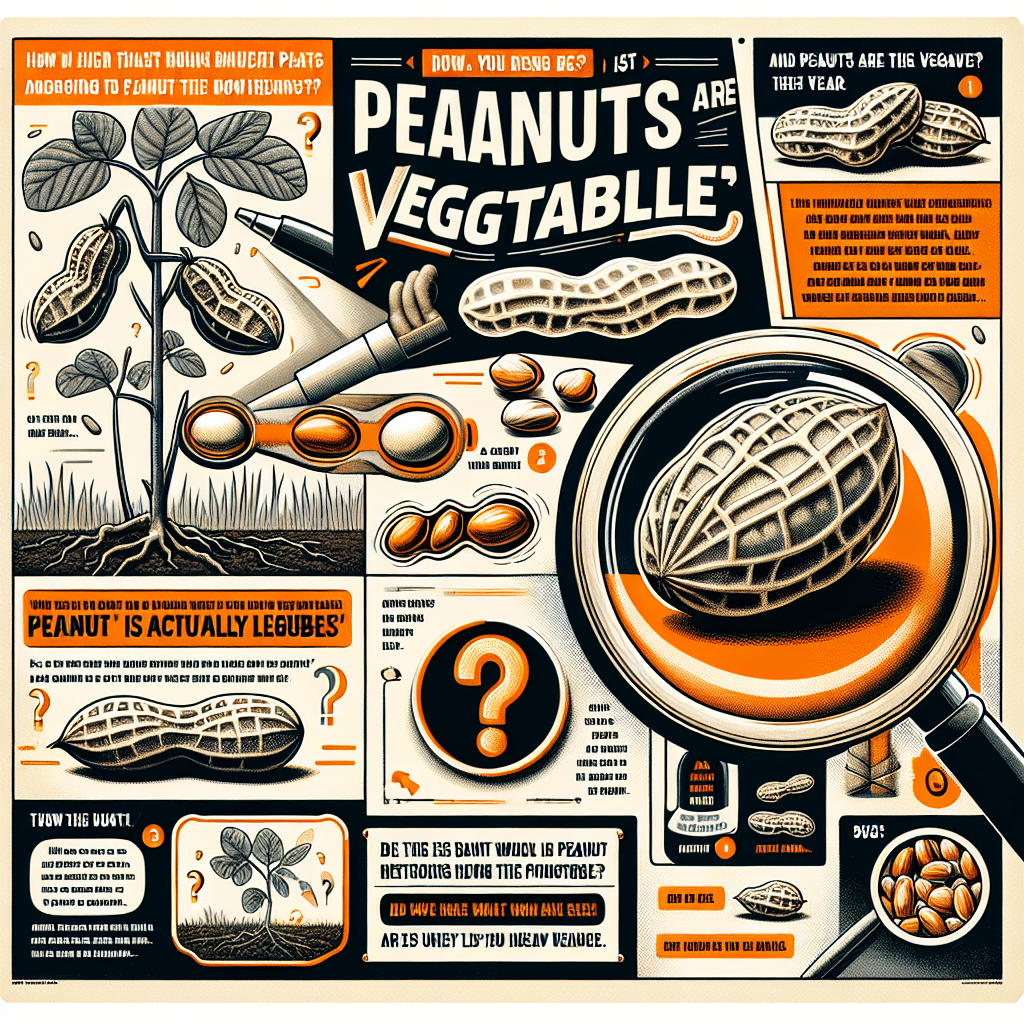Peanuts Are Vegetables: Unpacking The Myth
-
Table of Contents
- Peanuts Are Vegetables: Unpacking The Myth
- Understanding Plant Classifications
- What Are Peanuts?
- Botanical Perspective
- Culinary Perspective
- Debunking the Vegetable Myth
- Why the Confusion Persists
- Health Benefits of Peanuts
- Environmental Impact of Peanut Cultivation
- Conclusion: The Verdict on Peanuts
- Discover ETprotein’s High-Quality Protein Products
Peanuts Are Vegetables: Unpacking The Myth

When it comes to categorizing foods, there are often misconceptions that lead to heated debates in the culinary world. One such debate revolves around peanuts and their classification. Are peanuts vegetables, or do they belong to another group entirely? This article aims to unpack the myth and provide clarity on the true nature of peanuts.
Understanding Plant Classifications
Before diving into the specifics of peanuts, it’s essential to understand the different categories of plant-based foods. Broadly speaking, plants can be classified into fruits, vegetables, legumes, nuts, and grains, among others. These classifications are based on botanical and culinary criteria.
- Botanical Classification: This is based on the structure and function of the plant parts. For example, a botanical fruit is the mature ovary of a flower and contains seeds.
- Culinary Classification: This is based on taste, texture, and how the plant parts are used in cooking. Vegetables are typically savory and used in main dishes, while fruits are often sweet and used in desserts.
What Are Peanuts?
Peanuts, scientifically known as Arachis hypogaea, are a unique crop that blurs the lines between these classifications. To understand where they fit in, let’s explore their botanical and culinary characteristics.
Botanical Perspective
From a botanical standpoint, peanuts are classified as legumes. Legumes are plants that bear fruit enclosed in pods, which typically contain multiple seeds. After a peanut flower is pollinated, the flower stalk elongates and bends towards the ground, burying the fertilized ovule in the soil where it matures into a peanut pod.
Culinary Perspective
In the kitchen, peanuts are often treated as nuts due to their similar taste and texture. However, true nuts, like acorns and chestnuts, are hard-shelled fruits that don’t open to release their seeds. Peanuts, on the other hand, have pods that split open, which is characteristic of legumes.
Debunking the Vegetable Myth
The myth that peanuts are vegetables likely stems from a misunderstanding of culinary classifications. While vegetables are typically parts of the plant such as leaves, stems, roots, and flowers, peanuts do not fall into any of these categories. Instead, they are the seeds of a legume, which is a distinct group from vegetables.
Why the Confusion Persists
The confusion about peanuts being vegetables may also be due to their versatility in cooking. Peanuts are used in a variety of dishes, from savory to sweet, and can be found in cuisines around the world. This adaptability might lead some to lump them in with vegetables, which are also used in diverse ways.
Health Benefits of Peanuts
Regardless of their classification, peanuts are a nutritious addition to the diet. They are rich in protein, healthy fats, vitamins, and minerals. Here are some of the health benefits associated with consuming peanuts:
- High in protein, making them a great option for vegetarians and vegans.
- Contain heart-healthy monounsaturated and polyunsaturated fats.
- Rich in antioxidants, which can help combat oxidative stress.
- Good source of dietary fiber, which aids in digestion and satiety.
- Provide essential vitamins and minerals such as vitamin E, magnesium, and folate.
Environmental Impact of Peanut Cultivation
Peanut farming has a relatively low environmental footprint compared to other crops. Peanuts require less water and can fix their own nitrogen, reducing the need for fertilizers. This makes them a more sustainable choice for those looking to reduce their environmental impact through their diet.
Conclusion: The Verdict on Peanuts
In conclusion, peanuts are not vegetables; they are legumes. This distinction is important for both botanical accuracy and culinary purposes. Understanding the true nature of peanuts can help consumers make informed choices about their diets and appreciate the versatility and nutritional benefits of this remarkable legume.
Discover ETprotein’s High-Quality Protein Products
If you’re looking to incorporate more plant-based proteins into your diet, ETprotein offers a range of products that cater to various needs. Their selection includes organic rice protein, clear rice protein, pea protein, clear pea protein, pumpkin seed protein, sunflower seed protein, mung bean protein, and peanut protein. These products are non-GMO, allergen-free, and characterized by a neutral taste, making them an excellent addition to any meal or supplement regimen.
About ETprotein:
ETprotein, a reputable protein Chinese factory manufacturer and supplier, is renowned for producing, stocking, exporting, and delivering the highest quality organic bulk vegan protein and plant proteins. They include Organic rice protein, clear rice protein, pea protein, clear pea protein, pumpkin seed protein, sunflower seed protein, mung bean protein, peanut protein etc. Their offerings, characterized by a neutral taste, non-GMO, allergen-free attributes, cater to a diverse range of industries. They serve nutraceutical, pharmaceutical, cosmeceutical, veterinary, as well as food and beverage finished product distributors, traders, and manufacturers across Europe, USA, Canada, Australia, Thailand, Japan, Korea, Brazil, and Chile, among others.
ETprotein specialization includes exporting and delivering tailor-made protein powder and finished nutritional supplements. Their extensive product range covers sectors like Food and Beverage, Sports Nutrition, Weight Management, Dietary Supplements, Health and Wellness Products, and Infant Formula, ensuring comprehensive solutions to meet all your protein needs.
As a trusted company by leading global food and beverage brands and Fortune 500 companies, ETprotein reinforces China’s reputation in the global arena. For more information or to sample their products, please contact them and email sales(at)ETprotein.com today.












